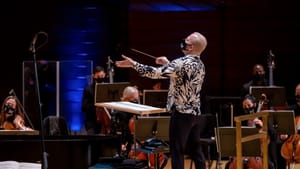Stay in the Loop
BSR publishes on a weekly schedule, with an email newsletter every Wednesday and Thursday morning. There’s no paywall, and subscribing is always free.
French fantasies
The Philadelphia Orchestra presents Ravel and Bizet

I suspect that Yannick Nézet-Séguin has a special place in his heart for Georges Bizet and Maurice Ravel, the two French composers featured on last week’s Digital Stage streaming concert of the Philadelphia Orchestra.
Bizet, assured a place in music history for two operas, Carmen and The Pearl Fishers, was born in 1838 and died tragically young in 1875, just a few months after the birth of Ravel. Ravel is probably best known for the pops favorite Bolero, but the program selected for this concert consisted of more lyrical fare, fresh but surprisingly deep. Nézet-Séguin is able to draw upon his own exhaustive knowledge of operatic drama, but also from his affinity for the fluidity and charm of the music of these composers.
A lovely beginning
Although Bizet’s name is listed first in the program title, it is with Ravel that the concert begins, and what a lovely beginning it is. Still new in his role as principal oboist, Philippe Tondre has the honor of sounding the opening notes of Le Tombeau de Couperin, a work of four movements (in its orchestral transcription). Tombeau is a 17th-century word for a memorial piece, and François Couperin was an esteemed composer of the French Baroque. Soon the oboe, its bright tone clear and pleasantly reedy, is blending with the mellow call of the clarinet, and four delightful portraits are painted by the musical brushstrokes of the Impressionist master.
Some listeners who have heard this familiar work for years may be surprised to learn that the memorial is not for Couperin, but written in the style of that composer. The work is actually a memorial to friends of Ravel who lost their lives in World War I, including the Gaudin brothers Pierre and Pascal, the composer’s childhood friends. The brothers lost their lives on the same day, killed by the same shell, in November 1914.
But despite the anguish Ravel experienced recalling friends lost in combat, he composed this work as a light but not light-hearted tribute. Its elaborate melodic streams course through the orchestra, whose sound shimmers with beauty, complexity, and grace.
A transcendent Mother Goose
Ravel’s Mother Goose suite also is a work not quite what one would expect. While the composer creates nearly a dozen miniature tone poems inspired by childhood fantasies such as Sleeping Beauty, Beauty and the Beast, and the Empress of the Pagodas, there is nothing childish or simplistic about them. Each reverie is elegant; dream-like in that the distant land of childhood is the backstory of every mortal, and as misty as memories of sleep. Such wonderful moments to savor throughout, from delicate bird songs to the murmuring of that gentle giant, the contrabassoon. Nézet-Séguin pulls it all together in a transcendent conclusion as uplifting and stirring a finale as you will ever hear.
An early miracle
Bizet’s Symphony in C is one of those little miracles in classical music, like the teenage works of Mendelssohn and Mozart, dating from the composer’s 17th year while he was a student at the Paris Conservatory. The symphony’s four movements are not particularly innovative harmonically, but oh-so-original in the outpouring of melody, the variety of upbeat rhythms, and tunes that are hard to forget.
Nézet-Séguin has switched some of the musicians on the second half of the program, but the sound is still captivating, and the feeling is flawlessly French. The seeds of Bizet’s career as a composer of opera surely lurk in this four-movement work. In the second movement, you half expect a dashing tenor to emerge from the wings and burst into song. And yet, in the same movement, the intermingling of oboe and flute suggests a mysterious realm in which music is free from the dictates of popular drama. The concert ends with an abundance of melody and good cheer, confirming again that while we will always crave the in-person closeness of the concert hall, there are many benefits to streaming to expand to audiences who prefer or need to experience performances from home.
What, When, Where
The Philadelphia Orchestra presents Ravel and Bizet. Maurice Ravel, Le Tombeau de Couperin and the Mother Goose Suite; Georges Bizet, Symphony No. 1. Conducted by Yannick Nézet-Séguin. Performed at the Kimmel Center’s Verizon Hall and first streamed July 8, 2021. Ticket holders can access a stream through July 15, 2021. 215-893-1999 or philorch.org.
Sign up for our newsletter
All of the week's new articles, all in one place. Sign up for the free weekly BSR newsletters, and don't miss a conversation.

 Linda Holt
Linda Holt